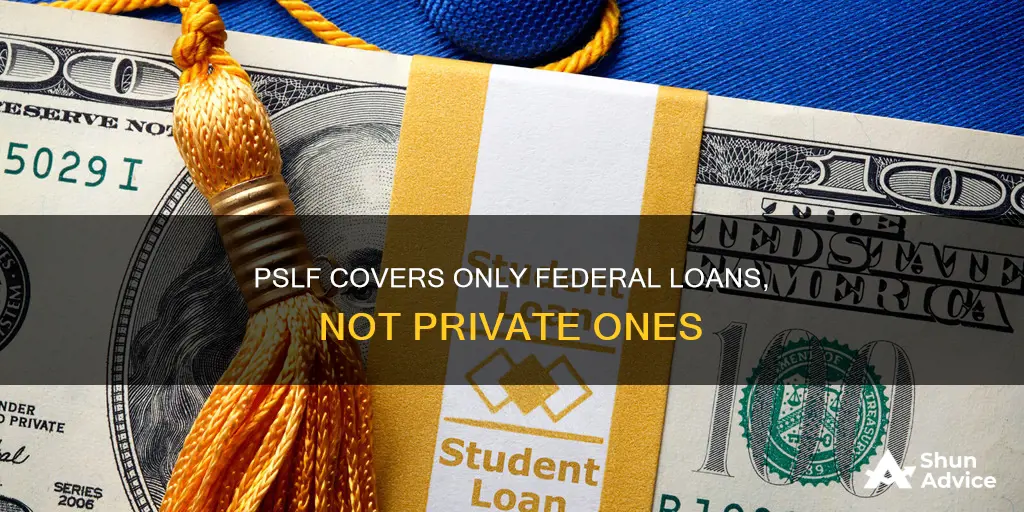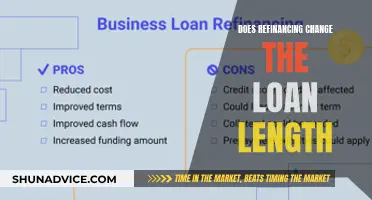
Public Service Loan Forgiveness (PSLF) is a federal program that forgives the remaining balance on federal student loans after borrowers make 120 qualifying payments while working full-time for a qualifying employer. Qualifying employers include government organizations, non-profits, and academic institutions. However, it's important to note that PSLF does not cover private loans of any kind, including loans from non-federal lenders, bar study loans, and privately refinanced loans.
| Characteristics | Values |
|---|---|
| Loan type covered by PSLF | Federal loans |
| Private loans covered by PSLF | No |
| PSLF eligibility depends on | The type of employer |
| Qualifying employers | Government organizations, AmeriCorps, Peace Corps, Nonprofit organizations, Religious organizations |
| Work type | Full-time, at least 30 hours per week |
| Loan forgiveness after | 10 years |
What You'll Learn

PSLF only covers federal loans
The Public Service Loan Forgiveness (PSLF) program is a federal program that forgives the remaining balance on eligible federal student loans after borrowers make 120 qualifying payments while working full-time for a qualifying employer. Qualifying employers include government organizations at any level, non-profit organizations, and religious organizations. It's important to note that PSLF only applies to federal student loans and does not cover private loans.
PSLF specifically targets federal student loans, which include subsidized, unsubsidized, and GR Plus loans for graduate students. This distinction between federal and private loans is crucial, as private loans are those obtained from non-federal lenders, such as banks or other financial institutions. Private loans often come with different terms, interest rates, and repayment options compared to federal loans.
The exclusion of private loans from PSLF means that borrowers who have taken out private loans to finance their education will not be eligible for loan forgiveness under this particular program. Private loans are the sole responsibility of the borrower and must be repaid in full, regardless of their employment or public service status. This distinction is important for students to understand when considering their financing options for higher education.
While PSLF provides a valuable safety net for borrowers with federal loans, those with private loans may need to explore alternative repayment strategies. Private student loan refinancing, for instance, can help borrowers secure a lower interest rate and become debt-free faster. However, refinancing federal loans is not advisable, as it would make them ineligible for forgiveness programs like PSLF.
It is always recommended to carefully consider the terms and conditions of any loan, including repayment options and potential forgiveness programs, before committing. Understanding the differences between federal and private loans, as well as the eligibility requirements for programs like PSLF, can empower borrowers to make informed decisions about their financial future.
Prosper Loan: Will They Call You Back?
You may want to see also

Qualifying employers include government organisations
Private loans are not covered by the Public Service Loan Forgiveness (PSLF) programme. This includes loans from non-federal lenders, bar study loans, loans from private institutions, and privately refinanced loans. PSLF is a federal programme, and as such, it only covers federal financial aid. This includes subsidised, unsubsidised, and GR Plus loans for graduate students.
Qualifying employers for PSLF include government organisations at any level, including federal, state, and local government agencies, as well as the following:
- AmeriCorps or the Peace Corps
- Nonprofit organisations that don't have 501(c)(3) status but provide a qualifying public service as their primary purpose
- Religious organisations
To be eligible for PSLF, you must work for a qualifying employer full-time, which amounts to at least 30 hours per week. If you work part-time for two qualifying employers, you may still be eligible as long as your total weekly work hours average at least 30 hours.
It is important to note that PSLF is not the only federal student loan forgiveness programme available. Other options include teacher loan forgiveness, income-driven repayment plans, and loan refinancing. However, refinancing federal loans will make them ineligible for forgiveness programmes.
Provident Funding: Condo Loan Options and Opportunities
You may want to see also

Non-profit organisations can be eligible
Private loans are not covered by the Public Service Loan Forgiveness (PSLF) program. Only federal loans are eligible for forgiveness under PSLF. However, non-profit organizations can be eligible for PSLF, provided certain criteria are met.
Firstly, the non-profit organization must be a qualifying employer. This includes non-profit organizations that don't have 501(c)(3) status but provide a qualifying public service as their primary purpose. Religious organizations are also included. To confirm eligibility, individuals can use the PSLF Help Tool and supply documentation outlining why the not-for-profit organization should qualify.
Secondly, individuals must work full-time for the qualifying employer, which amounts to at least 30 hours per week. It is important to note that if an individual starts a non-profit and has another full-time job, they will not be able to prove that they work full-time at their non-profit, and this will disqualify them from PSLF.
Thirdly, borrowers are required to submit a PSLF employment certification form annually or whenever they change jobs to confirm their employer's eligibility and maintain their own eligibility for PSLF. This form can be submitted through the PSLF Help Tool, which will prompt individuals to complete the form, send it to their employers for a digital signature, and then electronically submit it to the Education Department for processing.
Lastly, borrowers do not have to work for the same organization while making their qualifying payments or run the same non-profit during that time. They may still be eligible for PSLF even if they work for different qualifying employers, as long as they meet the other requirements, including making 120 qualifying payments. Once they have made these payments, they can file an official forgiveness request.
Prosper's Refinance Loans: Pros, Cons, and the Process
You may want to see also

Private loans are the sole responsibility of the borrower
Private loans are not covered by the Public Service Loan Forgiveness (PSLF) program. This federal program is only applicable to federal student loans. Private loans, including those from non-federal lenders, bar study loans, loans from the Harvard Student Loan Office, and privately refinanced loans, are the sole responsibility of the borrower.
PSLF is a forgiveness program designed to reduce the loan repayment burden for graduates working in full-time public sector jobs. These qualifying jobs are defined by the employer, and include government organizations at any level, non-profit organizations, and academic institutions. To be eligible for PSLF, borrowers must work for a qualifying employer full-time, which amounts to at least 30 hours per week.
Under the PSLF program, borrowers can have their remaining federal student loan balance discharged after making 10 years' worth of payments while working for a qualifying employer. This typically involves making 120 qualifying payments while working in eligible employment. It is important to note that PSLF eligibility is based on the borrower's employer and not the type of work they do.
While PSLF does not cover private loans, there are other paths to loan forgiveness for those with private student loans. For example, borrowers can consider refinancing their private loans, which can help them save money and become debt-free faster if they qualify for a lower interest rate. Additionally, income-driven repayment plans can lower monthly payments based on the borrower's income, and in some cases, result in a $0 monthly payment. However, refinancing federal loans will make them ineligible for forgiveness programs or income-driven repayment plans.
It is always advisable to avoid borrowing private loans if possible. If a student finds that they need to borrow private loans to afford a school, it may be an indication that the school is too expensive for their financial situation. In such cases, it is recommended to explore other options, such as community college or state school, to ensure academic and financial success without accumulating massive amounts of debt.
Principal's Influence: Loan Approval's Unseen Factor
You may want to see also

Other federal loan forgiveness programs exist
Private loans are not covered by the Public Service Loan Forgiveness (PSLF) program. Only federal financial aid is covered, including subsidized, unsubsidized, and grad student loans. However, there are other federal loan forgiveness programs available for those with private loans.
The US Department of Education and the Department of Defense offer benefits for military service members with federal student loans. These include interest rate caps under the Servicemembers Civil Relief Act and Department of Defense student loan repayment programs. Additionally, military service can count toward PSLF.
The Segal AmeriCorps Education Award is a benefit for those who complete a term of national service in an approved AmeriCorps program. After successful completion of service, individuals are eligible to receive an award that can be used to repay qualified student loans. AmeriCorps service can also count toward PSLF.
If an individual's school closes while they are enrolled or soon after they withdraw, they may be eligible for a discharge of their federal student loans if they meet certain requirements. Additionally, if an individual teaches full time for five complete and consecutive academic years in certain low-income elementary, middle, or secondary schools, they may be eligible for forgiveness of up to $17,500 if they meet other qualifications. This is known as the Teacher Loan Forgiveness (TLF) Program, and individuals should note that they cannot receive benefits under both the TLF Program and PSLF for the same teaching period.
Borrower defense to repayment is another option for discharging federal Direct Loans. If a school misled or lied to a borrower about something central to their decision to enroll or take out loans, borrowers can submit a borrower defense application.
How PSECU Can Help You With Construction Loans
You may want to see also
Frequently asked questions
No, private loans are not covered by PSLF. Only federal financial aid is covered, so subsidized, unsubsidized, and Grad PLUS loans are eligible.
Qualifying employers include government organizations at any level, AmeriCorps, the Peace Corps, and religious organizations. Nonprofit organizations that do not have 501(c)(3) status but provide a qualifying public service as their primary purpose also qualify.
PSLF discharges your remaining federal student loan balance after you make 10 years' worth of payments while working for a qualifying employer.







